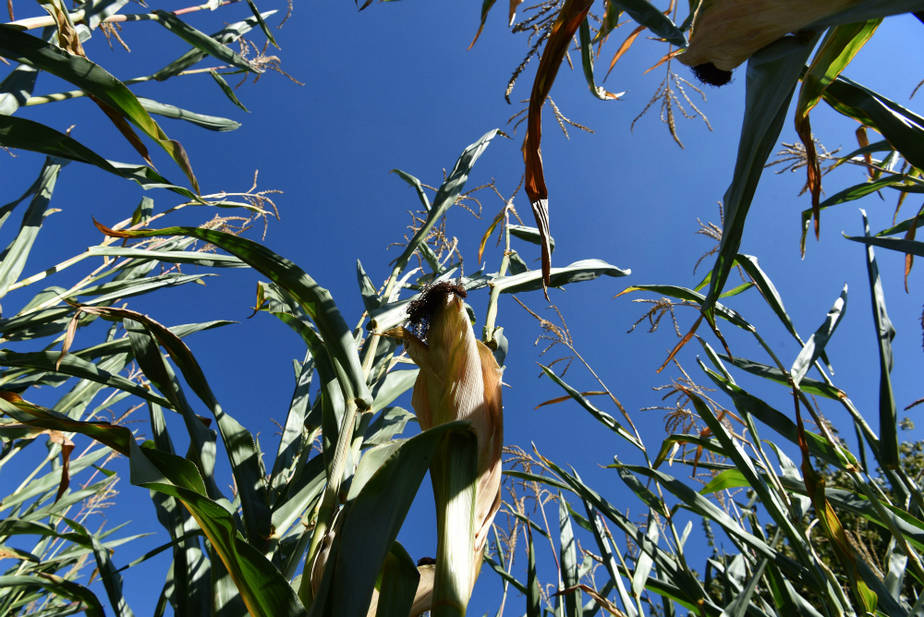How Deeply Will Rising Temperatures Cut into Crop Yields?
Corn and wheat are both at risk, according to a new study that calculates the impact on agriculture for each degree Celsius that global temperatures rise.

Corn yields face the greatest risk among staple crops, with yields estimated to fall an average of 7.4 percent for every degree celsius that temperatures rise, according to a new study. Credit: Patrik Stollarz/AFP/Getty Images
A sweeping study examining decades of research says that yields of the globe's most important crops—providing two-thirds of the world's calories—will plummet as temperatures rise.
For every degree Celsius that the Earth warms, corn yields will go down an average of 7.4 percent, according to the study, which focused on the effects of rising temperatures and did not directly examine other influences related to climate change.
Wheat yields similarly will drop by 6 percent on average for every degree Celsius that temperatures rise, rice yields by 3.2 percent, and soybean yields by 3.1 percent, according to the study. To put that in perspective, governments worldwide have set a goal of reducing their greenhouse gas emissions enough to keep the global temperature rise to less than 2 degrees Celsius this century.
Twenty-nine researchers from across the globe conducted the analysis of more than 70 studies—covering various types of models, approaches and locations across the world—and found that existing research all led, consistently, in one direction.
"What you're seeing here is many different lines of evidence pointing to the same conclusion," said Alexander Ruane, one of the study's co-authors and research scientist at the NASA Goddard Institute for Space Studies in New York.
The figures are global averages and vary by location. In some cases, yields went up. For example, modeling showed a modest boost in corn yields in France, and some experiments showed a rise in wheat yields in northern China. But on a global scale, the study revealed overall declines.
Many of the researchers involved in the study, published last week in the Proceedings of the National Academy of Sciences, are part of a consortium called AgMIP—the Agricultural Model Intercomparison and Improvement Project—which launched in 2010 with the aim of coordinating scientists who study the impact of climate change on agriculture. As Ruane put it, AgMIP helps "people who are already mandated to do this research, do it in a more connected and systematic way."
Research looking at the impact of temperature increase on crop yields has been done with different models and at different scales. The new paper combined the methods, looking at historical weather and yield data, statistical models and field-level experiments where crops were exposed to higher temperatures, in some cases to artificial heat.
While the study looked specifically at temperature increases, it also concluded that there will be indirect temperature impacts, including increased demand for water, water stress and reduced soil moisture—all leading to decreased yield.
Other studies have looked at the impact of rising carbon dioxide levels, including a recent study by Harvard University's T.H. Chan School of Public Health found that rising carbon dioxide levels could drive down the protein content of staple crops, including rice by 7.6 percent and wheat by 7.8 percent by 2050.
In some places, including Europe, where wheat yields have declined, increased temperatures are already having an impact on crops. "Yield increase has slowed down or even stagnated during the last years in some parts of the world and further increases in temperature will continue to suppress yields, despite farmers' adaptation efforts," the study says.
But the researchers believe the work also suggests that farmers may be able to adapt to changing conditions, especially in light of more coordinated research that looks at factors beyond temperature.
"What we're seeing in our research is that our vulnerability depends not just on external changes," Ruane said. "But on actions we take."
AgMIP's network of researchers are now working on research for the Intergovernmental Panel on Climate Change that looks at the impacts of warming at both 1.5 degrees and 2 degrees Celsius. This new research will look at these temperature increase scenarios and factor in regional economics, farming techniques, even diet, among other things. Because agriculture also can play a role in curbing atmospheric warming, the researchers will look at different agricultural approaches to keep temperatures below the 1.5 and 2 degree threshold.
"It's a final synthesis of all this work that's happened over 30 years," said Joshua Elliott, a research scientist with the Computation Institute at the University of Chicago, referring to the new study. "It's time to add in more complexity."
